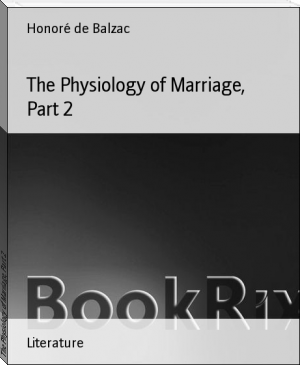The Physiology of Marriage, Part 1 - Honoré de Balzac (english novels to improve english .txt) 📗

- Author: Honoré de Balzac
Book online «The Physiology of Marriage, Part 1 - Honoré de Balzac (english novels to improve english .txt) 📗». Author Honoré de Balzac
How many landed proprietors are there who pay taxes amounting to no more than a hundred sous, twenty francs, one hundred francs, two hundred, or two hundred and eighty?
At what number shall we reckon those of the governmental leeches, who are merely quill-drivers with a salary of six hundred francs a year?
How many merchants who have nothing but a fictitious capital shall we admit? These men are rich in credit and have not a single actual sou, and resemble the sieves through which Pactolus flows. And how many brokers whose real capital does not amount to more than a thousand, two thousand, four thousand, five thousand francs? Business!--my respects to you!
Let us suppose more people to be fortunate than actually are so. Let us divide this million into parts; five hundred thousand domestic establishments will have an income ranging from a hundred to three thousand francs, and five thousand women will fulfill the conditions which entitle them to be called honest women.
After these observations, which close our meditation on statistics, we are entitled to cut out of this number one hundred thousand individuals; consequently we can consider it to be proven mathematically that there exist in France no more than four hundred thousand women who can furnish to men of refinement the exquisite and exalted enjoyments which they look for in love.
And here it is fitting to make a remark to the adepts for whom we write, that love does not consist in a series of eager conversations, of nights of pleasure, of an occasional caress more or less well-timed and a spark of _amour-propre_ baptized by the name of jealousy. Our four hundred thousand women are not of those concerning whom it may be said, "The most beautiful girl in the world can give only what she has." No, they are richly endowed with treasures which appeal to our ardent imaginations, they know how to sell dear that which they do not possess, in order to compensate for the vulgarity of that which they give.
Do we feel more pleasure in kissing the glove of a grisette than in draining the five minutes of pleasure which all women offer to us?
Is it the conversation of a shop-girl which makes you expect boundless delights?
In your intercourse with a woman who is beneath you, the delight of flattered _amour-propre_ is on her side. You are not in the secret of the happiness which you give.
In a case of a woman above you, either in fortune or social position, the ticklings of vanity are not only intense, but are equally shared. A man can never raise his mistress to his own level; but a woman always puts her lover in the position that she herself occupies. "I can make princes and you can make nothing but bastards," is an answer sparkling with truth.
If love is the first of passions, it is because it flatters all the rest of them at the same time. We love with more or less intensity in proportion to the number of chords which are touched by the fingers of a beautiful mistress.
Biren, the jeweler's son, climbing into the bed of the Duchesse de Courlande and helping her to sign an agreement that he should be proclaimed sovereign of the country, as he was already of the young and beautiful queen, is an example of the happiness which ought to be given to their lovers by our four hundred thousand women.
If a man would have the right to make stepping-stones of all the heads which crowd a drawing-room, he must be the lover of some artistic woman of fashion. Now we all love more or less to be at the top.
It is on this brilliant section of the nation that the attack is made by men whose education, talent or wit gives them the right to be considered persons of importance with regard to that success of which people of every country are so proud; and only among this class of women is the wife to be found whose heart has to be defended at all hazard by our husband.
What does it matter whether the considerations which arise from the existence of a feminine aristocracy are or are not equally applicable to other social classes? That which is true of all women exquisite in manners, language and thought, in whom exceptional educational facilities have developed a taste for art and a capacity for feeling, comparing and thinking, who have a high sense of propriety and politeness and who actually set the fashion in French manners, ought to be true also in the case of women whatever their nation and whatever their condition. The man of distinction to whom this book is dedicated must of necessity possess a certain mental vision, which makes him perceive the various degrees of light that fill each class and comprehend the exact point in the scale of civilization to which each of our remarks is severally applicable.
Would it not be then in the highest interests of morality, that we should in the meantime try to find out the number of virtuous women who are to be found among these adorable creatures? Is not this a question of marito-national importance?
MEDITATION IV.
OF THE VIRTUOUS WOMAN.
The question, perhaps, is not so much how many virtuous women there are, as what possibility there is of an honest woman remaining virtuous.
In order to throw light upon a point so important, let us cast a rapid glance over the male population.
From among our fifteen millions of men we must cut off, in the first place, the nine millions of bimana of thirty-two vertebrae and exclude from our physiological analysis all but six millions of people. The Marceaus, the Massenas, the Rousseaus, the Diderots and the Rollins often sprout forth suddenly from the social swamp, when it is in a condition of fermentation; but, here we plead guilty of deliberate inaccuracy. These errors in calculation are likely, however, to give all their weight to our conclusion and to corroborate what we are forced to deduce in unveiling the mechanism of passion.
From the six millions of privileged men, we must exclude three millions of old men and children.
It will be affirmed by some one that this subtraction leaves a remainder of four millions in the case of women.
This difference at first sight seems singular, but is easily accounted for.
The average age at which women are married is twenty years and at forty they cease to belong to the world of love.
Now a young bachelor of seventeen is apt to make deep cuts with his penknife in the parchment of contracts, as the chronicles of scandal will tell you.
On the other hand, a man at fifty-two is more formidable than at any other age. It is at this fair epoch of life that he enjoys an experience dearly bought, and probably all the fortune that he will ever require. The passions by which his course is directed being the last under whose scourge he will move, he is unpitying and determined, like the man carried away by a current who snatches at a green and pliant branch of willow, the young nursling of the year.
XIV. Physically a man is a man much longer than a woman is a woman.
With regard to marriage, the difference in duration of the life of love with a man and with a woman is fifteen years. This period is equal to three-fourths of the time during which the infidelities of the woman can bring unhappiness to her husband. Nevertheless, the remainder in our subtraction from the sum of men only differs by a sixth or so from that which results in our subtraction from the sum of women.
Great is the modest caution of our estimates. As to our arguments, they are founded on evidence so widely known, that we have only expounded them for the sake of being exact and in order to anticipate all criticism.
It has, therefore, been proved to the mind of every philosopher, however little disposed he may be to forming numerical estimates, that there exists in France a floating mass of three million men between seventeen and fifty-two, all perfectly alive, well provided with teeth, quite resolved on biting, in fact, biting and asking nothing better than the opportunity of walking strong and upright along the way to Paradise.
The above observations entitle us to separate from this mass of men a million husbands. Suppose for an instant that these, being satisfied and always happy, like our model husband, confine themselves to conjugal love.
Our remainder of two millions do not require five sous to make love.
It is quite sufficient for a man to have a fine foot and a clear eye in order to dismantle the portrait of a husband.
It is not necessary that he should have a handsome face nor even a good figure;
Provided that a man appears to be intellectual and has a distinguished expression of face, women never look where he comes from but where he is going to;
The charms of youth are the unique equipage of love;
A coat made by Brisson, a pair of gloves bought from Boivin, elegant shoes, for whose payment the dealer trembles, a well-tied cravat are sufficient to make a man king of the drawing-room;
And soldiers--although the passion for gold lace and aiguillettes has died away--do not soldiers form of themselves a redoubtable legion of celibates? Not to mention Eginhard--for he was a private secretary --has not a newspaper recently recorded how a German princess bequeathed her fortune to a simple lieutenant of cuirassiers in the imperial guard?
But the notary of the village, who in the wilds of Gascony does not draw more than thirty-six deeds a year, sends his son to study law at Paris; the hatter wishes his son to be a notary, the lawyer destines his to be a judge, the judge wishes to become a minister in order that his sons may be peers. At no epoch in the world's history has there been so eager a thirst for education. To-day it is not intellect but cleverness that promenades the streets. From every crevice in the rocky surface of society brilliant flowers burst forth as the spring brings them on the walls of a ruin; even in the caverns there droop from the vaulted roof faintly colored tufts of green vegetation. The sun of education permeates all. Since this vast development of thought, this even and fruitful diffusion of light, we have scarcely any men of superiority, because every single man represents the whole education of his age. We are surrounded by living encyclopaedias who walk about, think, act and wish to be immortalized. Hence the frightful catastrophes of climbing ambitions and insensate passions. We feel the want of other worlds; there are more hives needed to receive the swarms, and especially are we in need of more pretty women.
But the maladies by which a man is afflicted do not nullify the sum total of human passion. To our shame be it spoken, a woman is never so much attached to us as when we are sick.
With this thought, all the epigrams written against the little sex --for it is antiquated nowadays to say the fair sex--ought to be disarmed of their point and changed into madrigals of eulogy! All men ought to consider that the sole virtue of a woman is to love and that all women are prodigiously virtuous, and at that point to close





Comments (0)